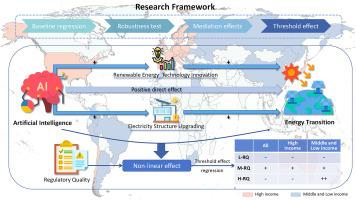The impact of artificial intelligence on the energy transition: The role of regulatory quality as a guardrail, not a wall
IF 13.6
2区 经济学
Q1 ECONOMICS
引用次数: 0
Abstract
In recent years, the economic impact and environmental contribution of Artificial Intelligence (AI) have gradually become a new focus in academia. This study uses a panel data sample of 50 countries to explore the impact of AI on energy transition (ET), aiming to fill an important research gap. The results highlight several critical insights. First, AI has had a significant positive impact on facilitating the ET. This conclusion still holds after a series of robustness tests. Second, AI positively affects ET by promoting renewable energy technology innovation and upgrading the electricity structure, resulting in both technological and structural effects. Third, the impact of AI on ET is non-linear. Threshold effect models show that AI impacts ET differently at various levels of regulation quality (RQ), exhibiting a double threshold effect. AI hinders ET when RQ is lower than the first threshold value. When RQ is in the second range, AI significantly facilitates ET. However, when RQ exceeds the second threshold value, AI hinders ET again. These findings provide insights into the mechanisms of AI's impact on ET and emphasize that an appropriate level of regulation is crucial for AI to facilitate ET. Finally, this study analyzes heterogeneity and offers targeted policy recommendations.

人工智能对能源转型的影响:监管质量作为护栏而非围墙的作用
近年来,人工智能(AI)的经济影响和环境贡献逐渐成为学术界的新焦点。本研究利用 50 个国家的面板数据样本,探讨了人工智能对能源转型(ET)的影响,旨在填补一项重要的研究空白。研究结果凸显了几个重要见解。首先,人工智能对促进能源转型具有显著的积极影响。经过一系列稳健性测试后,这一结论依然成立。其次,人工智能通过促进可再生能源技术创新和电力结构升级对能源效率产生积极影响,从而产生技术效应和结构效应。第三,人工智能对发电量的影响是非线性的。阈值效应模型显示,人工智能对不同监管质量(RQ)水平下的发电量的影响不同,表现出双重阈值效应。当 RQ 低于第一个阈值时,人工影响会阻碍蒸散发。当 RQ 处于第二阈值范围时,人工影响会显著促进蒸散发。然而,当 RQ 超过第二个阈值时,人工智能又会阻碍 ET。这些发现深入揭示了人工智能对 ET 的影响机制,并强调适当的调节水平对人工智能促进 ET 至关重要。最后,本研究分析了异质性,并提出了有针对性的政策建议。
本文章由计算机程序翻译,如有差异,请以英文原文为准。
求助全文
约1分钟内获得全文
求助全文
来源期刊

Energy Economics
ECONOMICS-
CiteScore
18.60
自引率
12.50%
发文量
524
期刊介绍:
Energy Economics is a field journal that focuses on energy economics and energy finance. It covers various themes including the exploitation, conversion, and use of energy, markets for energy commodities and derivatives, regulation and taxation, forecasting, environment and climate, international trade, development, and monetary policy. The journal welcomes contributions that utilize diverse methods such as experiments, surveys, econometrics, decomposition, simulation models, equilibrium models, optimization models, and analytical models. It publishes a combination of papers employing different methods to explore a wide range of topics. The journal's replication policy encourages the submission of replication studies, wherein researchers reproduce and extend the key results of original studies while explaining any differences. Energy Economics is indexed and abstracted in several databases including Environmental Abstracts, Fuel and Energy Abstracts, Social Sciences Citation Index, GEOBASE, Social & Behavioral Sciences, Journal of Economic Literature, INSPEC, and more.
 求助内容:
求助内容: 应助结果提醒方式:
应助结果提醒方式:


